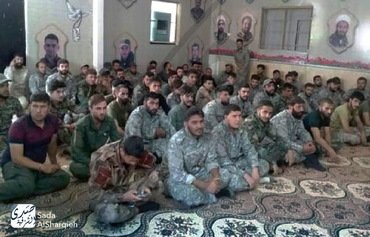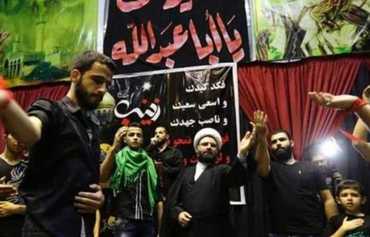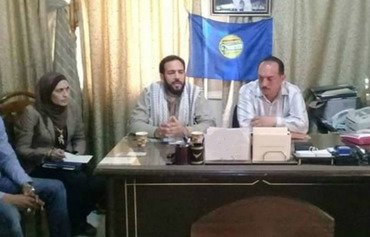The Iranian Cultural Centre in Deir Ezzor has taken control of a number of schools in and around the border town of Albu Kamal in a move local residents say is part of an effort to spread Iranian influence in the strategic area.
The centre began by repairing schools in Albu Kamal and some surrounding towns that were damaged in the fighting with the "Islamic State of Iraq and Syria" (ISIS), Deir Ezzor activist Jamil al-Abed told Diyaruna.
The centre, which is affiliated with Iran's Islamic Revolutionary Guard Corps (IRGC), will take over the running of these schools, even though they are government schools affiliated with the Syrian Ministry of Education, he said.
It will directly oversee the curriculum, he said, and will require students to take Farsi language classes, in a move that area residents see as a manifestation of Iranian occupation, warning this will have serious repercussions.
![The entrance to the Iranian Cultural Centre in Deir Ezzor, which has been rehabilitating schools in Albu Kamal and taking control of their curricula. [Screenshot from a video posted by Deir Ezzor 24]](/cnmi_di/images/2020/09/24/26232-Iranian-Cultural-Centre-600_384.jpg)
The entrance to the Iranian Cultural Centre in Deir Ezzor, which has been rehabilitating schools in Albu Kamal and taking control of their curricula. [Screenshot from a video posted by Deir Ezzor 24]
![Baath Party and Iranian Cultural Centre officials attend an event aimed at attracting children to the ranks of Iran-affiliated militias in Deir Ezzor. [Photo courtesy of Talaeh Deir Ezzor]](/cnmi_di/images/2020/09/24/26234-Deir-Ezzor-event-600_384.jpg)
Baath Party and Iranian Cultural Centre officials attend an event aimed at attracting children to the ranks of Iran-affiliated militias in Deir Ezzor. [Photo courtesy of Talaeh Deir Ezzor]
Al-Abed said he has learned that the centre will appoint teachers at these schools. Among the new appointees are teachers who were previously sent to Iran to receive training on the Iranian curriculum and Farsi language instruction.
Schools that are now under the centre's control include the Hittin School in Albu Kamal, the Sharia Secondary School in Albu Kamal, the girls school in the town of al-Sukkariyyah, the elementary school in the town of al-Hiri, and the school in the town of al-Suwayiya.
IRGC-affiliated technical workshops have already begun at these schools, under the direct supervision of the IRGC's official in Deir Ezzor, "Hajj Askar", and the centre's official in Deir Ezzor, "Hajj Hussein", he said.
Some of these schools had required only minor rehabilitation work, but Syrian regime institutions had neglected to undertake the necessary repairs in the recent period, allowing them to deteriorate, al-Abed noted.
Local reaction
The centre is preparing for the opening of these schools by putting in place a language-learning programme styled as "Baraem al-Furat" (Buds of the Euphrates), where Farsi will be taught as a main language, al-Abed said.
Parents are being encouraged to send their children with the offer of large sums of money -- up to one million Syrian pounds ($1950) -- if their children pass the Farsi language courses with high grades, he said.
Yet many area residents are completely opposed to the Iranian initiative, he said, which aims to "impose control through curriculum and language, with the clear aim of increasing Iranian influence in the region".
They are reluctant to voice their objections openly, however, he added, as this would expose them to pressure and possibly detention.
Meanwhile, others are going along with these moves in the hope of receiving the proffered in-kind and financial assistance, he said, due to the dire economic conditions they are facing.

![An IRGC official attends a ceremony for teachers held by the Iranian Cultural Centre in Deir Ezzor. [Photo courtesy of Euphrates Post]](/cnmi_di/images/2020/09/24/26231-IRGC-teacher-ceremony-600_384.jpg)






